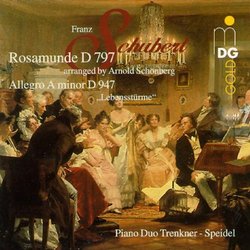| All Artists: Schubert, Piano Duo Trenkner-Speidel Title: Rosamunde (Piano Duo Version) Members Wishing: 0 Total Copies: 0 Label: MD&G Records Release Date: 1/20/1998 Genre: Classical Styles: Historical Periods, Modern, 20th, & 21st Century Number of Discs: 1 SwapaCD Credits: 1 UPC: 760623076324 |
Search - Schubert, Piano Duo Trenkner-Speidel :: Rosamunde (Piano Duo Version)
 | Schubert, Piano Duo Trenkner-Speidel Rosamunde (Piano Duo Version) Genre: Classical
|
Larger Image |
CD Details |
CD ReviewsTwo Natives of Vienna... Sébastien Melmoth | Hôtel d'Alsace, PARIS | 06/05/2005 (5 out of 5 stars) "What is not made clear in Amazon's listing of this most excellent disc of rare art is the fact that Schubert's en'tr acte music from Rosamunde is here presented in Schoenberg's 1902 piano reduction for four hands. Remarkable!" Schubert and Schoenberg = Strange but Happy Bedfellows Hexameron | 05/02/2007 (5 out of 5 stars) "Schubert's Rosamunde Incidental Music is a collection of stupendous and delightful pieces. It was played in 1823 as an accompaniment to Helmina von Chezy's four-act play, Rosamunde "Princess of Cyprus," which is set in the ancient world and centered on romance and political intrigue. Schubert's unabated melody and compositional talents are demonstrated quite well, and one can imagine a contented audience during the premier. However, it was Arthur Sullivan and George Grove, who, after rummaging through some dusty manuscripts safeguarded by one of Schubert's friends, stumbled upon what remained of the Rosamunde score. This was in 1867.
In 1903, Arnold Schoenberg, the radical twentieth century atonal pioneer, decided to work on a four-hand piano arrangement of some of Rosamunde's numbers. Whatever his reasons for transcribing this particular work, Schoenberg left his modern philosophy and serial-tonality at home to produce a brilliant, compelling and wonderfully potent piano arrangement. With tremendous constancy, this music pours out rich melodic ideas and subtle beauties. It's difficult not to be hooked with the gorgeous harmonies and dramatic utterances in the Overture. But it's the infectious theme which follows that is even more bewitching. Josef Huttenbrenner, one of Schubert's assistants has arranged a piano arrangement of the Overture as well, found here: Schubert: The Unauthorised Piano Duets. However, I was totally won over with Schoenberg's arrangement and more importantly, the thrilling interpretation given by the indefatigable Trenkner/Speidel piano duo. Of the three Entr'acte's, it's difficult to pick a favorite. Indeed, the first marked "Allegro" is so pensive and lush in sound; its design was rumored to be involved with Schubert's Unfinished Symphony (perhaps as the missing finale?). Whatever the case, this music is pure Schubert, overflowing with poignancy and serenity. The Entr'acte marked "Andante" is another breathtaking work with ample "Sturm und Drang," particularly half-way through, where the march-theme swells to a majestic plane. Again I must remark on the piano duo's innate skills, technical coordination and musicality. The unmarked third Entr'acte sounds incredibly akin to the Op. 142 Impromptu in B-flat (No. 3). One of Schubert's amazing talents is thus clearly presented here: he utilizes a seemingly identical theme but rewrites the phrases so well that the new idea doesn't sound "copied" from the other. After the engaging Entr'acte's, there are two highly satisfying and memorable Ballet pieces. The first Ballet opens with a similar march-like introduction as the first Entr'acte, but what ensues is a triumphant dance with orchestral tremoli and other rapturous pianistic devices. Lightest and most exuberant of all is the second Ballet piece, marked "Andantino." Here Schubert unwinds with humor and gives us a cute little romp with cogent quasi-operatic flair. Honestly, I find in these works more than satisfactory music, but enthralling piano renditions. I do not even feel it's necessary to compare these arrangements with the original score; the piano duo's performance is enough to label this music a success. And one composition that certainly needs no other arrangement is Schubert's tempestuous "Lebenssturme" D. 947 for four-hands. I've heard two other duo's including Goldstone and Clemmow execute this with gusto and lyricism, but for some reason I find Trenker and Speidel's tempo and Classical fire much more attractive. For those who have never heard this, I think it's safe to call it one of Schubert's best four-hand works. Lasting almost 17 minutes, it follows Beethoven by exhibiting self-expressive angst and ingenious extension of the limits of sonata form. Bottom line: This is fantastic and accessible piano music. "Lebenssturme" is great by itself, but the Rosamunde numbers are so outstanding it's mind-blowing to think that this score could be rotting away in some cupboard if it were not for Sullivan and Grove. Schoenberg did his part, too, in producing a dignified arrangement that makes great use of the piano's singing tone and orchestral sonorities. As always, Trenker and Speidel leave me enchanted: they are a versatile piano duo who should be implored to record more often." |

 Track Listings (7) - Disc #1
Track Listings (7) - Disc #1